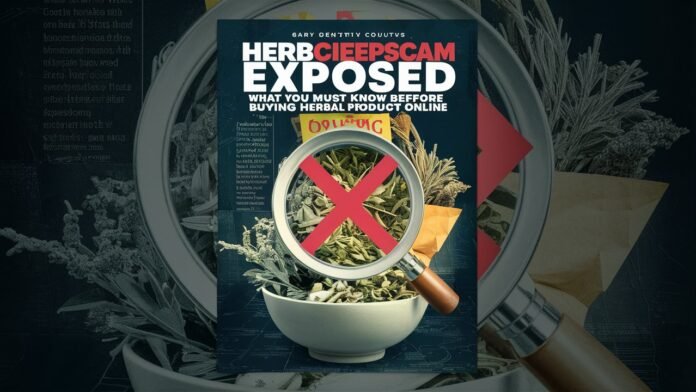The health and wellness market has exploded in recent years, with millions turning to natural remedies and herbal supplements to improve their lives. However, this surge in popularity has also given rise to an unfortunate trend: scams. One of the latest names circulating online is “Herbciepscam.” The term itself seems suspicious—blending “herb,” “scam,” and a non-existent brand name. But is there any truth behind this controversy, or is it just another internet rumor designed to grab attention?
In this article, we take a deep dive into the Herbciepscam phenomenon—what it is, how it emerged, and what consumers should know before trusting any herbal product sold online. Whether you’re someone who frequently shops for supplements or simply curious about this trending keyword, this comprehensive guide will give you all the insights you need.
What Is Herbciepscam and Where Did It Come From?
At first glance, “herbciepscam” appears to be a mash-up of “herb,” “scam,” and potentially a typo or stylized name. However, in the world of digital scams, this kind of naming convention is not uncommon. Fraudulent companies often use obscure, pseudo-scientific brand names to give an air of legitimacy, only to vanish once they’ve taken your money.
The origin of “herbciepscam” seems to be rooted in online forums, where users began reporting strange transactions, questionable products, and unverified health claims associated with an unknown herbal supplement. These reports then made their way into blog posts, YouTube reviews, and Reddit threads, further fueling public suspicion.
What makes things even murkier is the lack of a real, traceable company behind the term. There’s no official business registry, no clear ingredients list, no transparent contact information—major red flags for anyone looking to make a health-related purchase.
Common Signs That Herbciepscam Might Be a Scam
There are certain warning signs that consumers should always look out for when buying herbal supplements online, and unfortunately, Herbciepscam checks several of those boxes:
-
Lack of Transparent Branding:
There’s no official website, product photos, or verified sellers linked with “herbciepscam.” This is a major indicator that it could be a placeholder name for a scam campaign or a deceptive landing page. -
No Scientific Backing or Lab Tests:
Legitimate herbal supplements usually cite studies, clinical trials, or at least some lab testing. Herbciepscam offers none of these—just bold promises and vague benefits. -
Overly Positive “Reviews” with No Verified Buyers:
Many of the so-called positive testimonials about Herbciepscam are generic, copied, or appear on low-authority blogs. They don’t offer specifics, and none come from verified platforms like Trustpilot or Amazon. -
Payment Issues and Missing Deliveries:
Several forum posts mention failed deliveries, mysterious subscription charges, and no response from customer support once a purchase is made. This is perhaps the strongest indicator that something is seriously wrong.
How Online Herbal Scams Like Herbciepscam Work
These scams often follow a predictable pattern:
They start with targeted ads on social media, promoting an “ancient remedy” or “miracle herb” that claims to cure everything from chronic fatigue to cancer. Once the user clicks the ad, they’re redirected to a slick-looking page filled with fake testimonials and countdown timers to create urgency. After entering their payment details, users are either charged multiple times or receive nothing at all.
In many cases, these scams are part of a larger network of fake supplement companies, making it nearly impossible to get a refund or trace the real perpetrators. This is why consumers must approach all unfamiliar products—especially those with vague names like “Herbciepscam”—with a healthy dose of skepticism.
Safe Alternatives to Risky Herbal Products
If you’re truly interested in herbal supplements for health and wellness, there are many legitimate options available:
-
Consult with a licensed naturopathic doctor or herbalist who can recommend trusted brands.
-
Look for third-party certifications like USP, NSF, or ConsumerLab, which verify the ingredients and safety of supplements.
-
Buy from established retailers such as iHerb, Swanson, or health-focused sections of Amazon with verified reviews.
-
Check for ingredient transparency—every bottle should clearly list what’s inside, with no proprietary “mystery blends.”
Conclusion: Is Herbciepscam a Warning or a Wake-Up Call?
The keyword “herbciepscam” might not refer to a single company, but rather to a broader warning sign about how easy it is to fall for slick marketing in the herbal supplement space. Whether it’s a fabricated product name or a shadowy online brand, one thing is clear: consumers must stay vigilant.
In a time when health is more valuable than ever, placing blind trust in unverified herbal solutions could lead not only to financial loss but also health risks. Use discernment, do your research, and always prioritize brands with proven track records.
FAQs About Herbciepscam
Q1: Is Herbciepscam a real company?
No, there is no verified business registry, website, or product associated with the name Herbciepscam. It appears to be a placeholder or warning term for a potential scam.
Q2: Are there any real customer reviews for Herbciepscam?
Most “reviews” are unverified and appear to be spam or fake endorsements. No legitimate platforms like Trustpilot list real reviews.
Q3: What should I do if I think I’ve been scammed?
Immediately contact your bank or credit card provider to block further charges. File a complaint with the Federal Trade Commission (FTC) or your country’s consumer protection agency.
Q4: Can I trust herbal supplements sold online?
Yes, but only if they come from well-known, certified brands. Always check for third-party testing, transparent labeling, and genuine customer feedback.
Q5: Why is Herbciepscam trending online?
It may be a fabricated keyword generated by SEO monitoring tools, used to highlight scammy trends in herbal sales. Its vague, suspicious-sounding name likely adds to curiosity and caution.


